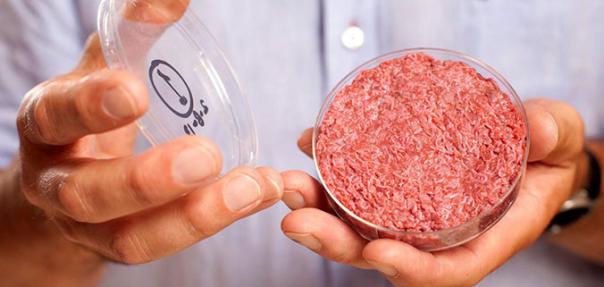
These synthetic substitutes use animal stem cells harvested from livestock and replicates them in the lab to produce muscle fibres. This creates a product that is 100% real meat but without the antibiotics and slaughterhouses associated with conventional agriculture production.
Terms such as ‘lab-grown’, ‘cultured’, ‘synthetic’ and ‘clean’ are just some used to describe it - and are sending the meat industry into frenzy.
Chris Bryant, doctoral researcher in consumer perceptions of clean meat at the University of Bath, commented on the use of the term ‘clean’.
He said: “‘Clean meat’ helps highlight the benefits to consumers. It is ‘clean’ in an environmental sense (like ‘clean energy’) because it uses much less water and produces far fewer greenhouse gas emissions compared to conventional meat.
"More importantly, it is literally cleaner, because it is free of the pathogens and faecal contamination found in conventional meat.”
Bryant supports the idea that lab-grown meat should feature alongside conventional meat in supermarkets, to show that there is little differentiation between the two. The only dividing factor would be that one is grown in a field and the other in a petri dish.
Yet with more customers conscious of where their food comes from, these animal friendly substitutes could boost sales.
He said: “Most people don’t like thinking about where meat comes from. People feel very uncomfortable thinking about the reality of factory farming and slaughter – but enjoying the taste of meat is the number one reason why people don’t go vegetarian. 'Clean' meat is a chance for consumers to have their steak and eat it.”
While lab-produced meat is still a few years away - producers are aiming to release it by 2021. However, it is likely that 'clean meat' will be sold in high-end restaurants before it supermarkets due to high prices and for 'novelty seeking consumers,' researchers claim.
The UK is the third largest beef provider in Europe with approximately 10 million cattle grazing British fields (2015).
Experts ask whether switching to lab grown beef would impact the agricultural market?
While lab-based meat is likely to reduce traditional farming, Byrant said, it could also give way to different agricultural methods: “It is possible that different types of farming will be required in order to produce components of the 'clean meat' growth medium. Perhaps farmers will have the opportunity to produce 'clean meat' themselves.”
This shift to lab-grown meat is the next step in tackling environmental issues on a global scale. With one cow drinking up to 41,640 litres of water a year and the main producer of methane, it seems that man-made meat could help the world 'go green'.
Bryant commented: “These problems aren’t going away – the global demand for meat is set to rise by 73% by 2050, and our current production methods simply are not sustainable.
"Compared to conventional meat, 'clean meat' produces 96% fewer greenhouse gas emissions, uses 96% less water, and 99% less land."
The petri dish meat has the same nutritional content as conventional meat, simply because it is real meat. As some producers are looking to improve fat content of their products, this green alternative could be a step in the sustainable direction.